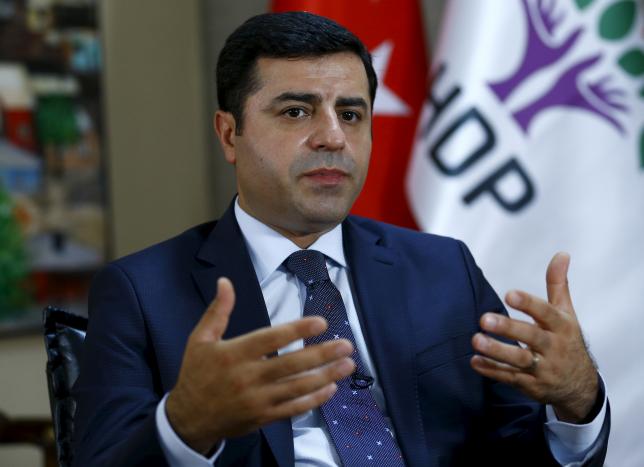Turkey's Kurdish opposition sees clash with PM over cabinet seats
ANKARA: The leader of Turkey's pro-Kurdish opposition said on Tuesday his party was ready to take part in an interim power-sharing government but he would not be surprised if the prime minister tried to exclude it.
President Tayyip Erdogan formally called for a fresh parliamentary election late on Monday in a widely anticipated move after two months of coalition talks failed to produce a coalition government.
Erdogan met Prime Minister Ahmet Davutoglu on Tuesday and was expected to ask him to form a temporary power-sharing government to lead Turkey to the election slated for Nov. 1.
Under the constitution, all parties should be represented in such an "election government" according to the seats they hold in parliament. But Turkey is in untested waters - never before has such an arrangement been necessary - and the main opposition CHP and nationalist MHP have said they will not take part.
The participation of the pro-Kurdish Peoples' Democratic Party (HDP), which entered parliament for the first time in June after winning 13 percent of the vote, is highly contentious, particularly as Turkish jets are bombing Kurdish militants.
The sight of Kurdish opposition politicians in cabinet seats would anger nationalists, potentially costing the ruling AK Party votes at the next election and again preventing it from forming a single-party government.
HDP leader Selahattin Demirtas said he believed all his party's deputies were eligible for cabinet positions, apart from its co-leaders, who will be responsible for election preparations. But he warned of efforts to exclude the HDP.
"We will have no hesitation in exercising our constitutional right and participating in the government," Demirtas told reporters in the capital Ankara.
"(But) we should not be surprised if they breach the constitution and try to form a government without HDP. Such an attempt would be rejected by the Constitutional Court."
MATTER OF PRINCIPLE
The AKP, founded by Erdogan, lost its majority in a June 7 election for the first time since coming to power in 2002, complicating Erdogan's ambition of forging a more powerful presidency and plunging Turkey into political uncertainty not seen since the fragile coalition governments of the 1990s.
The instability has sent the lira currency to a series of record lows, unnerving investors already concerned about rising violence in the mainly Kurdish southeast and the threat of blowback after the NATO member last month opened its bases for U.S. coalition air strikes on Islamic State militants in Syria.
Declaring it part of a "synchronised war on terror", Turkey launched a military campaign against the Kurdistan Workers' Party (PKK) a month ago, bombing the Kurdish militant group's camps in the southeast and in northern Iraq in response to what is said were rising attacks against the security forces.
Foreign Minister Mevlut Cavusoglu told Reuters in an interview on Monday that 61 soldiers and police officers had been killed by the PKK and that air strikes on PKK targets would continue until the group laid down weapons.
Erdogan has accused Demirtas and the HDP of links to the militants - considered a terrorist group by Turkey, the United States and Washington - and has suggested that the immunity of its lawmakers with links to such groups be lifted.
But the government has actively engaged the HDP in a peace process with the Kurdish militants and under Demirtas' leadership the party won higher-than-expected support in June, crossing a threshold to enter parliament for the first time.
"Six million people voted for us and we have the right to have three ministers," Demirtas said, adding that participation in the interim government was more a matter of principle than an attempt to accumulate political power.
"It doesn't really matter which ministries we get, all in all it's a temporary cabinet, and it doesn't have much chance of achieving much concrete action. We give importance to representation at the cabinet, that's all."
The refusal of Turkey's two other opposition parties to take part raises the prospect of the interim cabinet being dominated by the AKP. Seats not taken up by the opposition can be given to "independents" outside parliament, who could include loyal bureaucrats and ex-AKP members.






